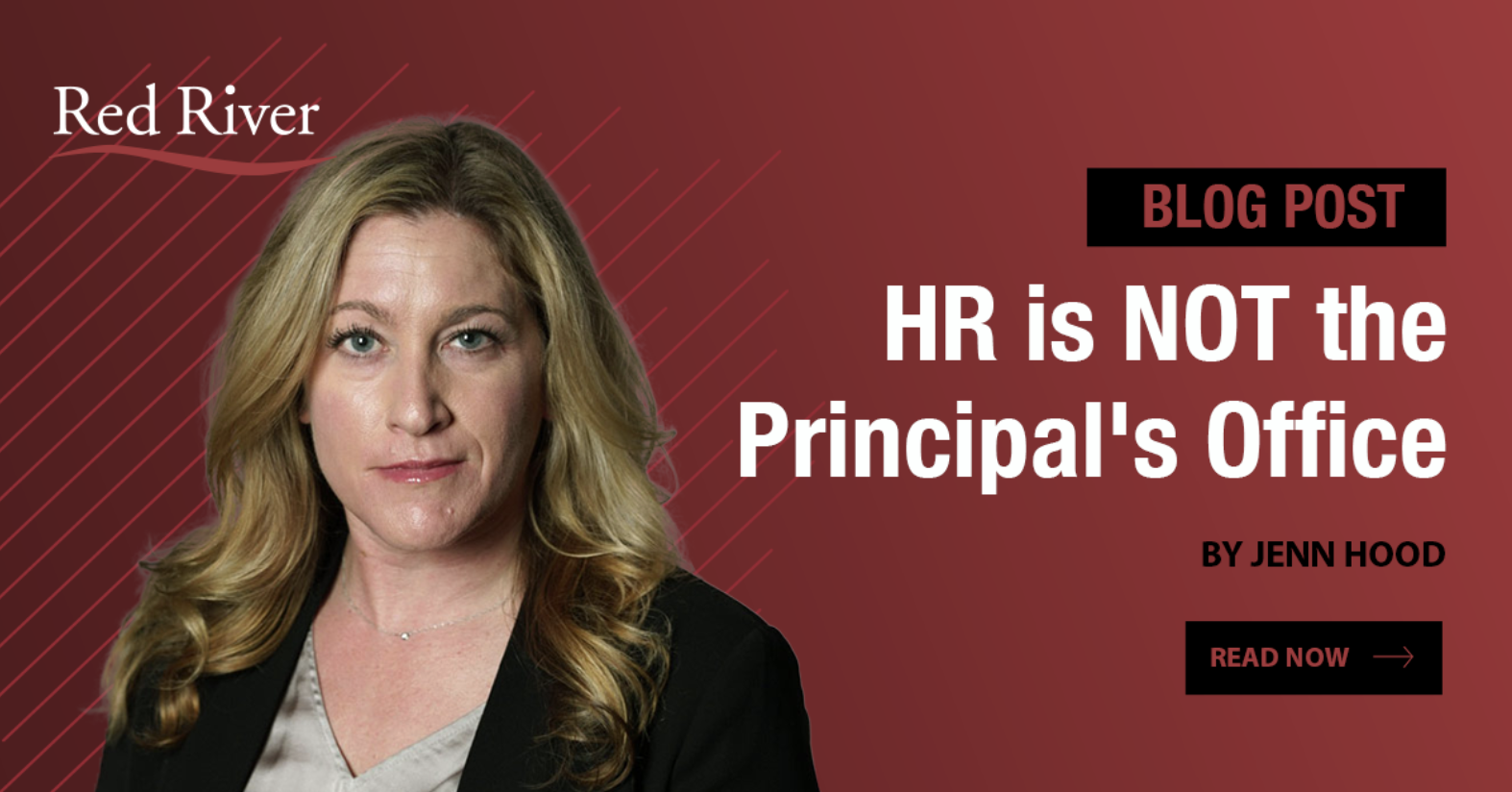
HR is NOT the Principal’s Office
When you get a call or email from HR, raise your hand if your first thought any of the following:
“Note to self: clear browsing history.”
“Ugh, it’s time to sign off on XYZ policy again.”
“Yeah, yeah, yeah, open enrollment I heard you already.”
“What now?!”
If your hand is in the air, you are not in the minority. For many, communication from HR feels like being called to the principal’s office.
The role and perception of HR is a result of an organization’s needs, its culture, and the HR team’s capabilities and focus. If your Human Resource department is playing the role of HR Police, killing fun wherever they may find it, delivering blistering disciplinary documents and bullet-proof policies that protect the organization (and perhaps crush the souls of the employees), then yes, when HR calls you are being called to the principal’s office.
But it doesn’t have to be that way.
I learned a great lesson early in my career, it was a simple interaction that helped me determine the type of HR leader I wanted to be. I was new to the organization; I was passionate, and I wanted to prove myself. I drafted a new policy that I was hoping to implement companywide. I took it to the CEO who read my policy memo, then politely turned the document back to me and asked me to read it as if I was brand new to the organization. He challenged me to think about what the perception of that new employee would be.
I was astonished. Wasn’t my job to protect the company? That’s why I was brought on right? But then, as I put myself in the place of being a new hire and read through a policy that sounded as if it was drafted by a robot, I got it. It was in this moment that I learned one of the most important lessons of my career, the realization that the manner in which I engaged with employees could directly impact their experience. I could make HR the ogre, or instead, I could position HR as a partner and a resource for employees.
Over the span of my career, I’ve worked with and for organizations that chose to leverage their HR department in many different ways: policy keeper, police, risk abatement, partner and finally culture ambassador. Having had the opportunity to operate in so many different forms and functions has its benefits, I have become more well-rounded HR professional capable to adapting my approach as needed. My varied experience has also allowed me to dial in to what I most enjoy – partner and culture ambassador. I can still flex the HR muscles I developed in the other areas, but I find myself most engaged and excited when I can focus on improving employee experiences and here at Red River, I have the opportunity to focus on exactly that!
Sure, improving employee experiences can mean new policies and benefits, but it can also be much more personal and more complicated.
For example, at a prior organization, there was one department I was unable to create real partnership with. The manager, overseeing this group did not see the value in HR’s involvement. Their focus was purely on outcome and the people part of the work equation was viewed more as a necessary evil. Thankfully, there was a change in leadership and HR was finally given access to this group. Our HR team had to work long and hard to gain the trust of not only the employees, but also the managers. As we dug in to learning more about how the department functioned, we soon recognized there was a considerable amount of dysfunction, distrust and generally poor morale.
Our HR team set a plan in motion to improve the experience of the employee and managers. Our first goal was to improve the leadership and communication of the managers. We developed and delivered a series of trainings to assist them in navigating difficult conversations effectively, how to give balanced feedback, and general management best practices. We provided one-on-one coaching for managers to reinforce the right behaviors and let go of the unhelpful practices of the past.
We found that the majority of managers fully embraced this partnership with HR. They realized we weren’t there to police their work or criticize their styles, but to help them manage their teams more effectively by providing tools, guidance and support.
We put in the time and effort to show up for that team, to engage with their work and interact with the employees. Perhaps other HR teams would have issued disciplinary action or pink slips, but we focused on building trust and a partnership with both the employees and managers, and in doing so helped create new connections between the two. As a result, the culture and morale within the department began to improve and a corner was turned.
A good culture is intentional, it much like gardening requires tending and feeding – and sometimes weeding. The portions of culture that you want to maintain or grow need the proper care, and in taking the time and effort to encourage them, you improve the employee experience, morale, engagement, and productivity.
I encourage HR teams to keep this in mind. Let’s not be the principal’s office. Let’s be gardeners, charged with cultivating a positive employee experience.
written by
Red River
We call ourselves a technology transformation company because we know how to harness the power of technology to change the way you do business and meet mission objectives. Our industry leading technical expertise, strategic partnerships and portfolio of services and solutions that span the entire lifecycle of technology have made us the partner of choice for clients in the commercial, federal and SLED markets interested in optimizing business processes and maximizing the value of their investments. Learn more about Red River.




